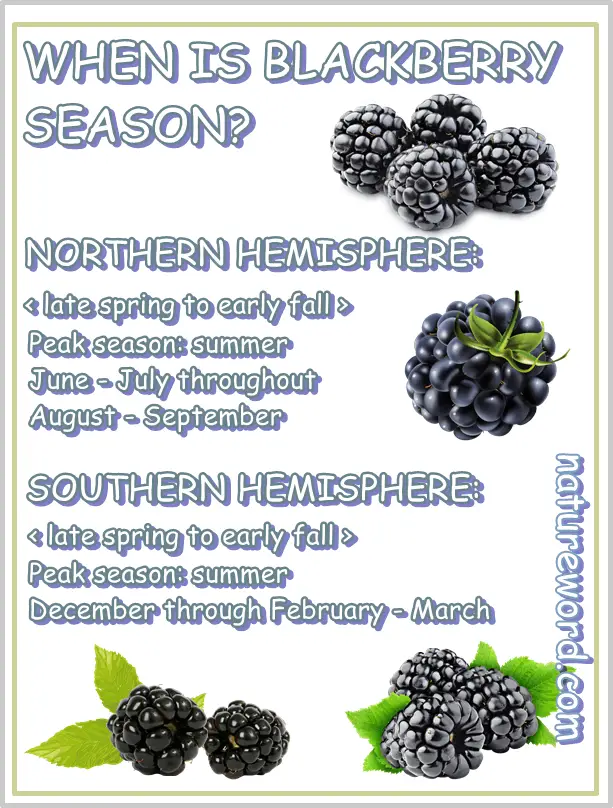Blackberries are in season right now and qualify as a seasonal summer fruit. But are blackberries in season only during summer months? What months exactly are blackberries in season? Are there different seasons for blackberries in the Northern vs the Southern hemisphere? When does blackberry season start and end? And how long does blackberry season last?
When is blackberry season?
Blackberries are naturally a seasonal summer fruit, that is, they are ripe and ready to pick in summer. However, given their extensive cultivation that spans over two hemispheres, blackberries are now more readily available as fresh fruit outside their original season, sourced from all across the world.

When are blackberries in season?
Blackberries are in season late spring to early fall, but peak season is summer hence the reason they are called seasonal summer fruits. This being said, a blackberry plant does not produce fruits for the entire length of the season, that is, late spring to early fall. Each shrub bears fruit for about a month to a month and a half during the season. Blackberries ripen gradually on the plant which means several harvests are required per plant and this takes place roughly over the course of a month, a month and a half in the season.
But different regions see the start of the harvest season at different times of the year. This is because the berries are heavily reliant on weather conditions for ripening and regional variations in temperature and other weather conditions will cause the start and end of the harvest season to vary depending on the region of cultivation. This allows for a long ‘official’ season during which fresh berries are supplied from different regions of cultivation from across the globe.
The start of blackberry season varies with region, but can also vary from year to year according to variations in temperature and other weather conditions. Unusually warmer weather can see the start of blackberry season a couple of weeks to a month in advance. Conversely, a longer winter and cooler spring temperatures can cause blackberry harvest season to start later and, as a result, also end later compared to previous years.

When is blackberry season in the Northern hemisphere?
In the Northern hemisphere, blackberry season is late spring to early fall, with peak season being summer. This means the first blackberries are ripe and ready to eat mid-late May to early-mid June at the earliest. Peak season is June-July to August-September. Blackberry season in the Northern hemisphere typically lasts until early to mid October when the last harvests take place.
When is blackberry season in the Southern hemisphere?
In the Southern hemisphere, blackberry season is also late spring to early fall and peak season is summer. But considering the seasons are reversed, this means blackberries are in season at opposite times during the year in the Southern hemisphere.
The first blackberries are ripe and ready to eat early November, but the season peaks December through February. Late season blackberries are available throughout March and until the beginning of April. The Southern hemisphere meets demands for the fresh berries roughly up until two months before the start of blackberry season in the Northern hemisphere.
Blackberry season by month
Blackberries are available for several months in a year, both in the Northern and Southern hemisphere, but peak season when supply is more abundant lasts about 3 months per hemisphere.
Blackberries season by month in the Northern hemisphere
- Early season: mid-late May to early-mid June
- Peak season for blackberries: June-July throughout August-September (depending on the region of cultivation)
- Late season: mid-September to early-mid October
Blackberries season by month in the Southern hemisphere
- Early season: starts early November
- Peak season for blackberries: December through February (depending on the region of cultivation)
- Late season: all of March to early April
How long does blackberry season last?
Harvest season for blackberries is two to three months depending on the region. However, if larger regions of cultivation are considered, that include more than one type of climate and experience significant variation in weather conditions, then blackberry season as in availability of the fresh berries can span over four or more months (e.g. blueberry season in the Northern hemisphere vs blueberry season in the Southern hemisphere).
Also see when is blueberry season and when are yellow raspberries in season.
Blackberries calories and vitamins
Blackberries are known to be naturally low in calories. How many calories in blackberries? A serving of 100 grams of fresh blackberries has only 43 calories (or kilocalories). This is just 10 calories more than strawberries and a number that makes blackberries rank high among foods low in calories.
One cup of fresh blackberries at 144 grams has just 62 calories (or kilocalories). And if you were to eat half a kilogram you would only get 215 calories, only enough for a snack.
Like is the case for most berries, blackberries too have a modest nutritional value. In terms of nutrition, only the content of vitamins C and K1 and dietary fiber stand out. A serving of 100 grams of the fresh berries provides over 23% of daily vitamin C values for an adult and 16.5% of daily vitamin K, as well as almost 4.9 grams of dietary fiber out of the recommended daily intake of 28 grams.
Blackberries also provide small amounts of vitamin B9, vitamin E, iron, magnesium and zinc (under 10% of daily values).
Despite the modest nutrition, there are quite a few benefits to eating blackberries, the best of which stem from the fruit’s high content of pigmented antioxidants.
